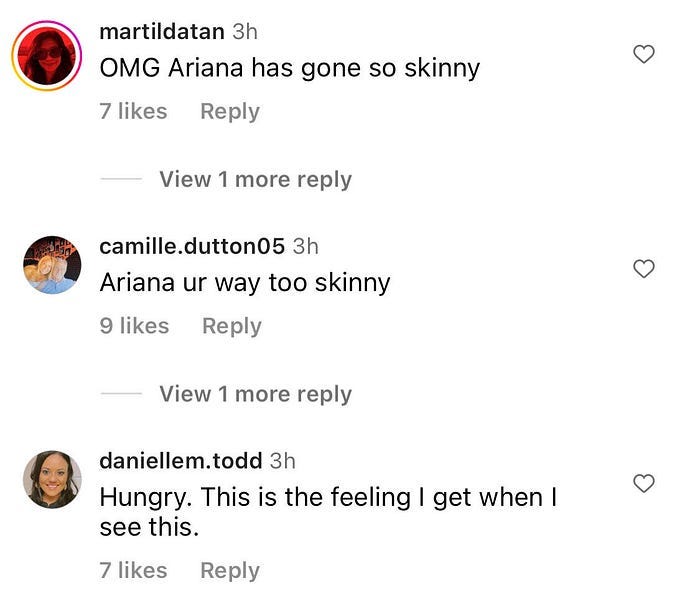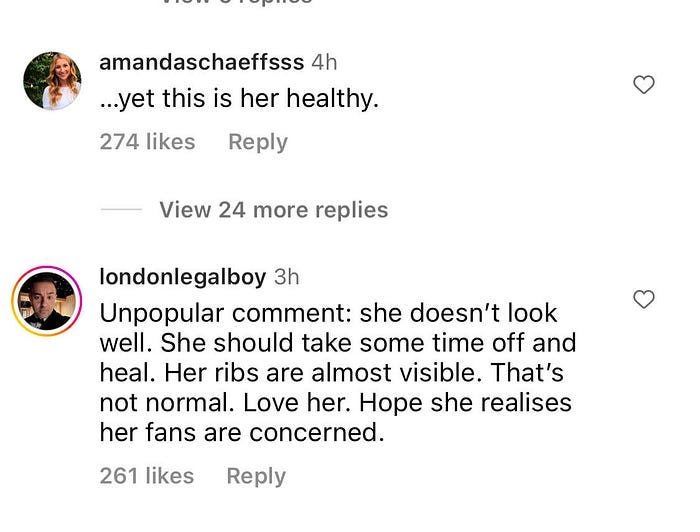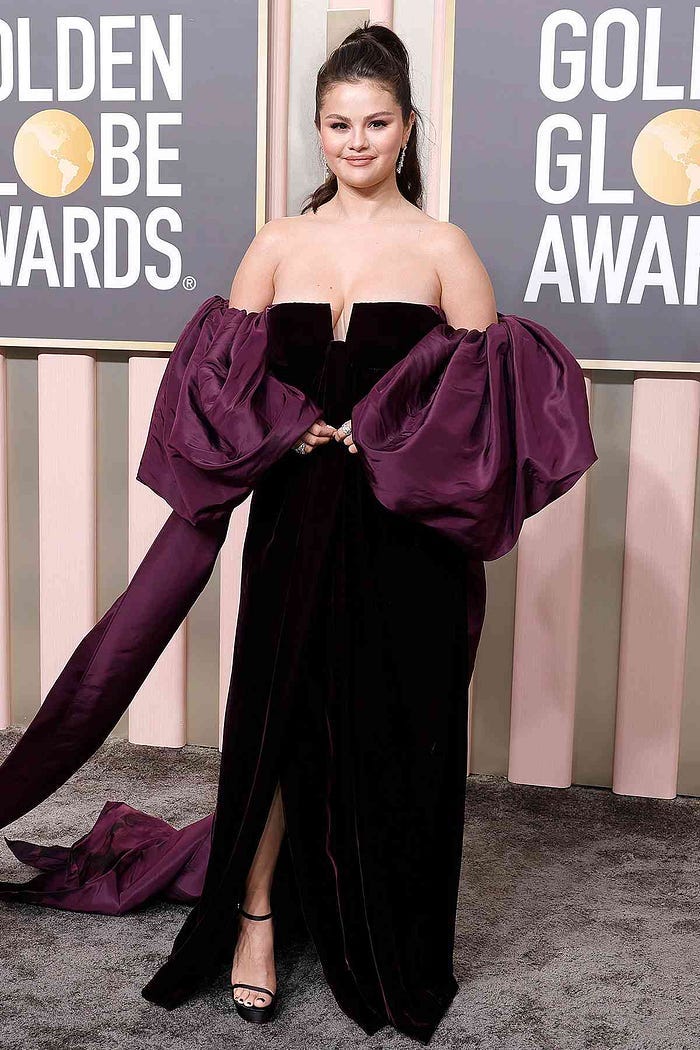Ariana Grande Promotes Body Neutrality in Viral TikTok Addressing Social Media Comments
“I think we should be gentler and less comfortable commenting on people’s bodies.”
Published in The Virago June 2023
On April 11th, in a startling twist, pop goddess Ariana Grande took to TikTok to address some of the comments her “fans” have been making about her body in the past few months. Ever since Ariana traded her signature brunette ponytail for bleach-blonde locks, stans, and random social media users alike have been openly discussing her “unhealthy weight loss.”
Knowing that Ariana has always been a petite woman, her latest photos never evoked any concern from me. I’ve been observing this discourse from a distance — occasionally stopping to read the various misogynistic delusions regarding Ariana’s “responsibility” to maintain a healthy image for her young, impressionable fans. I would roll my eyes, remind myself that these are only trolls, and move on to the next post.
As a cultural fiend, I’m exposed to the ugliest humanity has to offer on a daily basis so these characters barely phased me, at first. That was until I happened upon Ari’s TikTok on my For You Page.
It was then that I realized how mind-bogglingly unhinged this uproar regarding a woman’s weight fluctuation had become. That’s when I decided to — against my own best interests — immerse myself in the pits of her Instagram comments.
(TW: body shaming, eating disorder)
Ariana explained in her TikTok that the comparisons people were making to her “new body” versus her “old body” were completely off base.
“I was on a lot of antidepressants and drinking on them and eating poorly and at the lowest point of my life when I looked the way you consider my healthy. But that, in fact, wasn’t my healthy. (sic)”
-Ariana Grande, TikTok
She went on to explain that this was a grueling period of her life. The body weight these fans were referring to was from a time when she was grieving several compounding tragedies including the Manchester Arena suicide bombing during her concert in 2017 and the death of her ex-boyfriend, Mac Miller, in late 2018. On top of all of this, she began touring a few short months later.
Ariana says she’s since altered her diet and medications. She appears to be happier and more enthusiastic about the creative projects she’s working on. Fans have noticed that she hasn’t been as present on social media since her last album, Positions, which debuted nearly three years ago. These are all factors that support the reasonable narrative that lifestyle changes have affected her appearance.
Unnecessary speculation aside, in the simplest and most literal interpretation of her speech, Ariana undeniably provided an explanation as to why her body looks “different.” Even so, the public refuses to take her word seriously.
These people are so confident in their assumptions of what is best for a complete stranger without context or even an ounce of evidence to prove there’s a serious problem in the first place.
Observing this phenomenon felt, and still feels, like an episode of Black Mirror.
Does anything about this “controversy” sound familiar at all? I mean, of course, it does. We’ve been ruthlessly critiquing celebrity female bodies since the beginning of time. Something that should be a non-issue has been created into a spectacle and conspiracy. That’s nothing new.
Maybe it’s because this isn’t the first time I’ve written about our culture’s obsession with Ariana Grande’s appearance. Still — I can’t help but feel like something about this particular sequence of events is giving me deja vu.
Oh right. It just happened. On February 16, Selena Gomez, another ethereal pop queen, went live on Tik Tok explaining her weight gain after she’d received thousands upon thousands of hateful, nasty comments about how she looked at the 2023 Golden Globes.
“My weight would constantly fluctuate because I would be on certain medications(…) It was like they couldn’t wait to find a thing to bring me down. I was being shamed for gaining weight because of my lupus.(…) I just want people to know that you’re beautiful and you’re wonderful, and, yeah, we have days where maybe we feel like sh*t but I would much rather be healthy and take care of myself, and my medications are important and I believe they are what helps me. (sic)”
— Selena Gomez, TikTok LIVE
What never fails to astonish me when I catch these updates, despite how mind-numbingly predictable, is our culture’s raging hypocrisy. I’ve seen us rave about the annual trends of feminist retrospective redemption documentaries, speeches, or memoirs — Britney Spears, Pamela Anderson, Monica Lewinsky, Paris Hilton. We routinely explode with think pieces and apologies for weeks.
“We were so cruel! Let’s be better next time.”
Well, we’re not improving. We are still so cruel. We continue to fail, and not even in a unique way. In the exact same way over and over again except, if anything, astronomically louder with leagues more self-importance.
We didn’t have social media when many of these women entered the cultural scene. The tabloids would thoroughly bash them, but if the most opprobrious members of the public wanted to voice their irrelevant opinions to a celebrity directly, there were hoops to jump through. They had to type out a letter or email.
Social media platforms embolden the worst of us. Now, millions feel strongly about the fact that every single unmitigated thought needs to be heard and seen. All that hideous projection and deflection from the cursed mirror spewed into comment threads as if it’s not aimed at human beings and absorbed by millions more.
“I think we should be gentler and less comfortable commenting on people’s bodies.”
-Ariana Grande
I’m with you, Ari. Except I don’t think we should be comfortable at all. I think we should feel ashamed of this ghastly behavior.
I’ve written before about my grappling with fake-it-til-you-believe-it body positivity and its place in recovery from body image trauma. But over the past few years, I’ve been rethinking our societal needs. Witnessing our horrific behavior towards human beings online has convinced me that the positivity movement needs to take a sharp and deliberate turn to body neutrality if we intend to progress.
As an earlier celebrity advocate, actress Jameela Jamil blithely illustrated the concept in a 2019 interview: “Imagine just not thinking about your body. You’re not hating it. You’re not loving it. You’re just a floating head. I’m a floating head wandering through the world.”
Sounds delightful.
I try to put myself in the mind of one of these nauseating, physically-obsessed commentators, but I can’t even attempt to go there. None of it makes any sense.
Let’s humor the conspiracy theorists and say Ariana is struggling with an eating disorder — but she is in denial. Or maybe she’s ashamed to admit it. What are any of these comments going to do to help the situation? Are they at all giving off an air of genuine support? Are they creating a healthy environment where she can feel comfortable to confess and begin treatment?
Not even close. The comments accomplish nothing besides furthering harmful stigmas while putting Ariana under pressure to immediately fix a problem that is anything but simple. If these people knew the first thing about eating disorders, body dysmorphia, or any form of disordered eating, they’d understand that these are sensitive issues. Approaching with judgment is like pouring salt on psychological wounds. It is never the best way to intervene.
Ironically, one reason eating disorders are so common in Hollywood is due to our cultural obsession with and objectification of (both male and female) bodies. I guess we could argue about which came first, the chicken or the egg, but it doesn’t change the fact that throughout history, no matter who or what started the toxic beauty standards, we are still demanding them.
Our covert misogyny disguised as innocent gossip is unceasing when it comes to how people look and used to look and how they could improve their looks, and how we would prefer if they looked this way — because we were sold on the idea that our personal physical preferences (rooted in patriarchal biases) matter more than humanity, empathy, and critical thinking.
Because in this day and age, we feel more entitled to personal information from our entertainers than ever before despite having endless opportunities to advance past this invasive toxicity. It’s maddening to witness time and time again that no matter how much we preach acceptance and change, we always go back to our patriarchal roots.
I’m coming at this from the perspective of someone who assumes the best-case scenario is for Ariana to feel and be healthy, regardless of my opinion of how she appears on the outside. This is what many people promised they care about in their comments above, but I suspect their motivations were completely selfish.
It comes off as if these commentators were just itching to announce to the world that — for whatever reason — viewing an image of Ariana’s body was unsatisfying to them.
If these people were really concerned about her well-being, why would they use harmful language to communicate that? Such remarks about bodies that are “too skinny” can be triggering to those who are naturally slim. Many people have prominent collar bones or visible rib cages but are perfectly healthy.
Obviously existing in a skinny body comes with privilege, but that does not mean these humans are impervious to body image issues nor does it mean body-shaming them is ever acceptable.
Ariana admits in her TikTok she never makes such blunt announcements, and she avoids doing so because she doesn’t believe she’s any good at it. This is likely due to the barrage of vitriolic backlash she, or any woman in the public eye, receives anytime they say anything less than a cheerful expression of gratitude.
That’s the most nauseating aspect of these videos. Anytime a woman has to apologize for her body not being up to our everchanging standards, it’s always because they are railroaded into politely addressing the people who were so comfortably careless in demolishing them.
These people do not deserve their calm consideration. But they’re going to get it anyway. Because if these women don’t remain kind, the so-called fans will turn against them on a dime, and their haters will feel more justified in their bullying.
I’m aware that it is very much in vogue to validate everyone’s emotions. I tend to agree that encouragement can do wonders for our mental health.
But let me tell you a little secret: When it comes to someone else’s health and/or physical body, your opinion is not important. It is never valid. Not ever. Absolutely nobody is asking for you to speak, and I’d bet everything I own on the fact that neither Ariana nor Selena are on the edge of their seats waiting for your input either.
These women are not grateful for the fact that their fans are eager to invade personal boundaries while feigning concern. They’re not enthusiastic about the fact that obsessive parasocial relationships have stoked our longtime cultural belief that admonishment is just the price of fame.
We need to begin asking ourselves why slight differences in a complete stranger’s appearance have the power to emotionally affect us so. Just because a woman is in the public eye does not mean she has to look a certain way.
Ariana, Selena, Pamela, Britney, and Paris are entertainers. Their jobs are to perform. That’s it. They should be allowed to clock out and go home after. It’s not a part of their jobs to explain anything personal about their bodies to us. It’s never our business unless they themselves decide to share it with us.
Do me a favor and take the harshest comment you’ve ever posted online and look in the mirror as you read it aloud. Maybe this humiliating exercise is what’s necessary in order for us to understand the fact that fellow human beings deserve respect whether they’re face-to-face with you, performing on stage at a concert, broadcasted on the evening news, or posing in an Instagram snapshot.
The world does not need to hear you. Log off.
Is it a little hypocritical that I’m conveying this message to you by way of an opinion piece? Absolutely.
Call me haughty, but I know I’m right. How peaceful would it be if we only ever thought about our bodies in terms of health and functionality? Do you think it is possible for us to build a society where none of us are defined by or scrutinized for our physical appearances?
Well, I do. I believe in our potential to heal, we just have to commit to doing the work. And this work is going to have to start in the mirror.
Thank you for reading. To further support my writing, consider buying me a cup of coffee!









